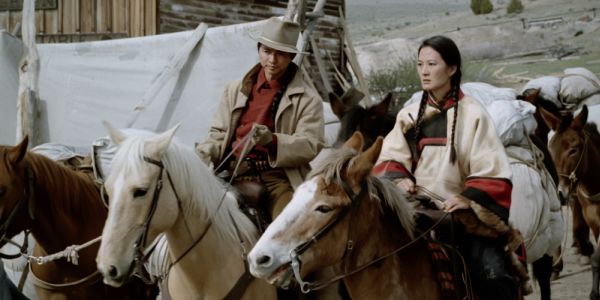The recent restoration and re-release of Nancy Kelly’s overlooked 1991 revisionist western Thousand Pieces of Gold is flying under the moniker as a “feminist western.” This endorsement lit up like a marquee to yours truly, the prospect of a feminist western is catnip to someone who’s both a rabid fan of the genre and an ally to the feminist cause. Naturally, the good people at Kino Marquee (who are hosting a 4K restoration via a virtual tour in lieu of these troubling times), aptly sold the movie, and Thousand Pieces of Gold delivers on that promise as a subtly brilliant revisionist western replete with period atmosphere and an original story.
A New Look into a Familar Past
Distinguished by a creative voice who identifies with the figure at the core of the story, Lalu (Rosalind Chao) a young Chinese woman, is sold into slavery by her impoverished family, and brought to America – landing in an Idaho mine town thanks to a Chinese wife trader (Dennis Dun). Here, she’s at the hands of a mercilessly greedy and chauvinistic saloon keeper/entrepreneur Hong King (Michael Paul Chan) who then tries to capitalize Lalu by fetishizing her Asian features (some things never change, eh?) and bidding her out as a prostitute to an overzealous crowd.

Lalu defends herself with righteous insistence that she’s not for sale. One level-headed patron and relative partner of Hong King, Charlie (Chris Cooper), eases the crowd and talks King into letting her work as a maid in order to eventually buy her freedom, at the cost of a thousand pieces of gold. This uneasy “deal” (the chances of Lalu earning that much is unlikely) lends an air of tension to the narrative that sits at the front. Providing enough room to let our characters develop as well as relinquish a thoroughly realized historical milieu.
Nancy Kelly strikes a unique tone with Thousand Pieces of Gold. There’s a sincerity to the film, and Kelly articulates Lalu’s tale with patience and maturity. The nature of the story naturally propels the feminist drive. If we look at the history of sexism in America and our treatment of immigrants (and those forcibly brought here), it doesn’t take much to do the math regarding the experience of a Chinese woman in the 1800’s.
Strong Cast Carries the Weight
Thousand Pieces of Gold is even-handed without being cautious. It might seem light at times, but there’s no need to rush into familiarity, and we get to grow into it at the same time as the characters. Lalu quickly establishes herself as a steadfast and motivated woman who refuses to be a victim or default to lovelorn, face-in-a-locket type. Rosalind Chao is rooted in this performance, creating a modicum of emotional range. Michael Paul Chan, whose hardened interpretation of the advantageous Hong King; the inverse of Lalu who’s cutthroat enterprising is somewhat ruthless, or is it the embodiment of American capitalism? You get the feeling that the prejudice he endures from the whites of the camp has less to do with race and more to do with his financial gain.
On the more romantic spectrum, there’s Charlie Bemis, brought to life by the always reliable Chris Cooper, whose subdued charisma is captivating. With the added presence of Will Oldham, it’s hard not to think about John Sayles’ Matewan, another revisionist western starring Cooper and Oldham four years before. There’s the undercurrent of a love story, but the picture is primarily concerned with Lalu, a creative decision that is shrewd and indicative of an instinctually strong storyteller.
Personal Passion
Nancy Kelly presses the film with personal resolve that’s thoroughly unpretentious and presents a driven women’s story that emanates a grounded spring of feminism. Thousand Pieces of Gold is a low cruising masterpiece that’s worthy to stand alongside superlative genre iterations from the period such as the aforementioned Matewan, The Ballad of Gregorio Cortez, or the more recent The Homesman from 2014.
In an extra-textual sense, the production and the events following Thousand Pieces of Gold tell another feminist story that is both tragic and inspiring. Nancy Kelly had to fight to get the movie made; backers wanted to tweak the script to fit more gender normative conventions, while others were hesitant to hire a first time director who was a woman to make a women’s story set in the west. Luckily these rough patches only stoked the flames, and she sought to get the film made regardless. While Thousand Pieces of Gold received positive critical notices, Kelly’s directorial career fell prey to the entrenched sexism of studio brass and producers; at one point, she was told, “You’re a good director, too bad you’re a woman.”
From Sexism to Optimism
Fortunately, there’s been some advances for women in the film industry even if the numbers are still criminally lopsided (in 2019 12% of the 100 top grossing films were directed by women, with the representation of women of color even more dire) and the doors for Kelly to realize her long cradled project, “When We Were Cowgirls” will hopefully open. Thanks to Kino Marquee/Kino Lorber Kelly’s Thousand Pieces of Gold is touring via virtual theatre and is attracting a new audience of admirers. Kino’s Blu-ray release of the film was released on May 26th with bonus features including audio commentary with director Kelly and Producer Kenji Yamamoto, interview with Kelly, and an essay from Anne Makepeace.
In lieu of this overlooked gem coming to the fore can we anticipate more underseen westerns coming to the fore? Will the changing tide of the film industry give more female directors like Kelly a career renaissance?
Watch Thousand Pieces of Gold
Does content like this matter to you?
Become a Member and support film journalism. Unlock access to all of Film Inquiry`s great articles. Join a community of like-minded readers who are passionate about cinema - get access to our private members Network, give back to independent filmmakers, and more.